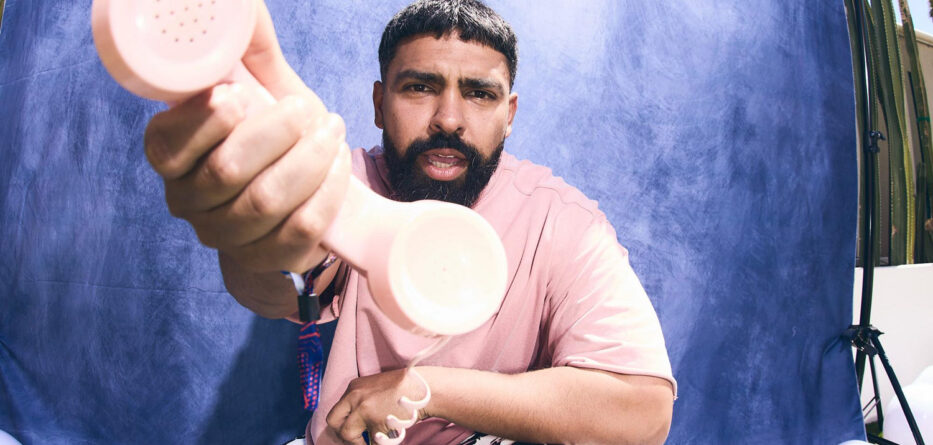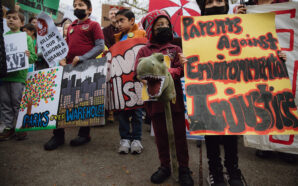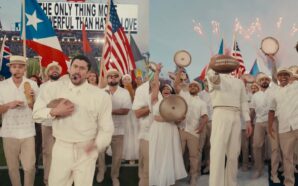Arturo Hilario
El Observador
The Bay Area is a unique place, and although that can be said about a lot of locations in the world, it’s the Bay Area’s specific recipe of natural beauty, history of social justice, culture, tech supremacy, housing inadequacy and vast economic inequality that make the contrasts so compelling to discuss.
A lot can be written about these contrasting elements of the region in traditional news media and scholarly analysis, but a much different conversation can arise from hearing from the people that live and breathe the Bay Area everyday on the streets themselves.
One man, Mario Riveira, has made a career of finding people willing to talk on the streets of the Bay Area and beyond, whether it be about the best burrito in the Mission, what Oakland rapper Too $hort’s favorite word is (hint: it’s not very safe for work) or why housing displacement and homelessness are rising, Riveira meets the moment where it happens.
These man-on-the-street interviews pose simple questions and get varied responses, the best ones are what end up on Riveira’s channels. Although his content is most popular on TikTok and Instagram, he does have a presence on YouTube where he hosts his longer form documentaries on societal issues.
“Every platform works differently. Every platform has a different algorithm. What’s important in this platform isn’t important in this platform. At first, I was just doing TikTok’s. Now we do everything. I don’t do X, though, formally Twitter. I do not mess with the people that own that company, I don’t mess with what they push. But besides that, we do everything.”
A recent post asks the question “What are 3 things that make you from the Bay Area” to local rapper Miles Minnick at a San Francisco 49ers game. He responds with culture, the taste of music, and being able to connect with everybody because, “In the Bay it’s like a gumbo pot.” He then proceeds to explain and show how people from the Bay dance to Taylor Swift the same way they dance to Hyphy music.
So the next time you’re at a party and see casual swaying back and forth while grabbing a collar, you’ve found a Bay Area resident.
Riveira was born in the East Bay in Contra Costa County, and moved to San Francisco for college, saying, “Then I never left because I was like, ‘Oh, I’m here. I’m where I need to be.’ I always wanted to live in San Francisco when I was younger. Now I have a family, a dog, and we live here.”
Beginnings & Finding a Voice
Riveira started his social media career around the time of the pandemic, first starting off by helping his wife Vanessa create content while also doing his own blogs and unboxing videos.
“So it actually started with mostly her and me taking pictures and videos of her. And then during the pandemic, I had a lot more time and just wanted to start my own thing, too. And then I was trying different things, and then the interviews just stuck. I tried those out, and they were doing pretty well, and then just kept running with it and running with it.”
Inspiration for man-on-the-street interviews came from two main sources for Riveira. One was comedian Billy Eichner’s comedy game show Billy on the Street with Billy Eichner.
“I always thought he was hilarious. I’m not the first person to ever do street interviews, but I would say I was one of the biggest figures in the Bay Area to start doing them, if not probably the biggest to ever have done it so far. But Billy on the Street was always an inspiration. He’s a gay man in New York City, and he does the same thing. He’s a little bit more intense when he does his interviews, but he was definitely an inspo. I love his work.”
The other inspiration was independent journalist Andrew Callaghan, formerly of YouTube channel All Gas No Brakes who more closely resembles what Riveira’s channels produce now, fun interviews intermixed with more serious news documentaries.
“I would say those two probably were the main figures. I started doing interviews and I was like, ‘Okay, I need to turn it up and I need to take this approach.’ Now, I’ve done it for so long. We do funny stuff, but then we could also do very serious stuff and very serious topics if we want to. I don’t hold back on what I do anymore.”
Finding his way along the online landscape across multiple social media apps, and landing in a spot where his form of entertainment found popularity and a home was a journey that involved tweaking what worked and what didn’t.
“We found the niche. And then the type of questions kept always evolving, and now we mostly do interview questions. We cover culture, we cover pop culture, we cover what’s going on news, and we’re just getting a bunch of people’s opinions. So that’s where it all started and where it’s at now.”
But making it a full time job wasn’t a consideration until he hit six digit follower counts. And with the support from his wife.
“The first year that I did it, I wasn’t really thinking about it like that until I hit 100,000 followers. And I was like, ‘Damn, I could do this full-time. I could take it to the next level.’ And it was a hard thing to think about because I was like, ‘There’s not really any security in it. It’s a risk.’ You know what I mean? It’s a risk, but shit, life’s a risk, carnal.”
Within independent media there are the positives of being able to do what you want and cover what you want, and that has been a big draw for Riveira and the audience he has accumulated over the years.
“I got no one funding me besides myself. So it’s like, I don’t have people in boardroom meetings telling me, ‘You can’t cover this topic. You can’t talk about this,’ or whatever. So there’s no holding back. The only thing that’s holding me back is myself and what I want people to see and view me as, and what standards I hold myself to.”
This ethos he goes by is evident in the consistency of the work, from all the short form street interviews to the types of short to longer form documentaries, covering alternative culture and society from the unique lens of a Latino man in the Bay Area.
“‘What do I want people to remember me by?’ You have to think about that a lot more instead of somebody saying, ‘You can’t cover that,’ like a boss or something. I don’t have a boss. So independent is the way to go. If you could do it and you could sustain it, it’s a lot of freaking work, but it’s the way to go for sure.”
Going Global
Following Riveira’s journey in the last few years has seen him go to the UK, to New York City, and even to the annual Gathering of the Juggalos festival in Thornville, Ohio.
“Yeah, that was fun, man, that was wild. We’re trying to expand outside of the Bay Area. I always say Bay Area is always going to be home base. I could always come here and do interviews, but me and the team are trying to do things bigger than just the Bay Area. I feel like media and music or whatever it is, entertainment, it’s easy to get trapped here. So I want to be bigger than the Bay Area. So when I come home, [I’ll be] one of those guys that made it out, and they’re more global, got more global reach.”
What matters is what’s in my heart and what I care about. The community that I built, they’re okay with hearing some of that stuff. We know some of that stuff needs to be talked about.
-Mario Riveira
Riveira will never stop claiming the Bay Area as his home, that is for certain. Though as he gets more familiarized with creating content in spaces outside of the Bay Area, he does want to branch out and bring the Bay Area to the world. Almost like some sort of ambassador, but he says he won’t call himself that.
“I’ve built a great big presence in the Bay Area. I don’t want to have a big head and say, ‘I’m an ambassador.’ But it’s like when I go to New York and I go to these other places, it’s like I’m bringing the Bay Area with me in a way. I’m bringing my family with me to this part of the country. We’re going to Mexico or wherever we go. It’s pretty sick. And people like that. They’re like, ‘Oh, man, someone around my section is doing it like this, and I get to follow the journey.’”
The City Of Sensitive Frauds
The City Of Sensitive Frauds is gentrification documentary released on YouTube on September 1, 2025. It was directed by Riveira and fellow Bay Area social media personality Abraham Woodliff who is known for his Instagram account @realbayareamemes, which posts the aforementioned memes relating to living in the Bay Area while also posting politically inclined content as well.
“That project came about when me and Abraham got together and wanted to do a podcast, and I was making a YouTube video about the gentrification of Treasure Island. And we’re on the island and we’re doing an interview. Then we went around and then we just thought to ourselves, ‘Dude, this needs to be bigger than Treasure Island. This needs to be Bay Area.’”
Taking 10 months to produce, the documentary gives audiences an unflinching look at the realities on the streets and shows the human costs of displacement, interviewing unhoused residents, local artists such as Doggtown Dro, Gunna Goes Global as well as political voices to highlight how developers, landlords and politicians erode the culture and community of the Bay Area through their capitalistic endeavors.
Although Riveira collaborated with Woodliff and works with a team of 2-4 depending on the project, he self-edited the entirety of the documentary, from hours of interviews, b-roll of San Francisco’s neighborhood’s and archive media from the San Francisco Library. Through all the long hours he says it was exciting to create.
“It was one of my favorite projects to ever put together. I sourced a lot of the imagery and a lot of sources from the San Francisco Public Library, [and] other people that wanted to be down with the project got the other photos and pictures, and I edited the whole thing myself. So it’s all 100% edited from me.”
In the journey to making his first documentary, Riveira found most surprising who exactly was accelerating the gentrification. He says speaking to former member of the San Francisco Board of Supervisors and housing rights activist Dean Preston was an enlightening experience.
“I really wanted to figure out who are these people actually gentrifying our neighborhoods? It’s these companies, these huge companies like Veritas Investments. It’s one of the biggest ones that own over 200 properties. And the tactics that they use to kick tenants out and get people out of their homes so they could just take control of it completely. And that was some of the craziest stuff that I learned for sure.”
Besides the corporate aspect, Riveira doesn’t mince words when taking aim at another group he says is also responsible for the housing inequality of the city, the state and beyond: “fake-ass progressives.”
“That’s the reason why we called the movie The City of Sensitive Frauds, because San Francisco is filled with a bunch of fake rich progressives.”
Riveira says the fake progressives refer to the ones that support progressive issues in theory and are pro YIMBY (Yes In My Backyard) in that they support building more housing when the reality is that more housing doesn’t offer the solution to expensive housing. It is an echo of a repeating situation in California, where throwing money at the problem without actually focusing on fixing the root causes results in the ineffectual liberal policies that are mocked by Republican politicians and certain parts of the Democrats own progressive wing.
“There’s not much middle class left in San Francisco at all. So it’s just like these fake progressive people. ‘Let’s build more housing. That’s the best option we have!’ Yeah, more housing is great. We need more housing. But more housing isn’t going to help anybody if it’s not affordable. Affordable housing, not more housing.”
His main critique against this abundance crowd is that new buildings may be asking for thousands of dollars a month for rent, which to him bluntly outlines the unaffordability. “Is the housing going to go to some fucking person that could pay $4,000 a month, $5,000 a month easily? Or is it going to be affordable housing where people could actually afford to live there? So that’s a big battle in San Francisco that I didn’t necessarily understand before that I understand now for sure. And that’s not just the city anymore. Gentrification has completely taken over California. And it’s spreading out.”
It is no hyperbole to call the housing situation in many parts of the country a five alarm fire, as minimum wage stays stagnant and inflation continues to affect American families. Riveira refers to the dire economic and cultural destruction to more of a bomb going off.
“It’s like a freaking nuclear bomb. And then just slowly the radiation just spreads. You know what I mean? But San Francisco is ground zero for gentrification, for sure.”
Changes
Most recently Riveira released a 12 minute documentary about the ICE activities in San Francisco, called ICE Agents Invade San Francisco, in it he goes around interviewing residents of the city including politicians while giving his own introspection on why San Francisco’s legacy as a sanctuary city is on the line. The issue which is a prevalent disturbance in many diverse neighborhoods around the country.
But the ever changing and amorphous nature of social media popularity almost requires the need for quick pivots into other branches of content. Riveira thinks he could move into the vlogumentary format, where he continues to be the front-facing reporter while documenting other cultures or issues.
“[The City Of Sensitive Frauds] was one big step into me making more serious films. I do like making serious films. It’s a lot of freaking work. And we’ll see what the future holds, if I’m going to keep making documentaries or not, or if I’m going to make vlogs.”
As he tows the line between the comedy and the more journalistic endeavors, I asked Riveira whether the initial shift from only making that viral content to creating more nuanced journalistic projects has changed his audience, or if they followed him into the other realms.
“I mean, if they want to stick around, they have no choice but to follow me. They could always unfollow me if it’s too much for them, which people have left comments like that before. But most people have followed me in the journey and are totally down with the journey.”
“I get amazing comments all the time. I got a comment a couple of days ago, and somebody was like, ‘I’ve been following you from the beginning. I love how the page is evolving and what it evolved to from where you first started making jokes on a corner.’ So, I definitely got people that support it, for sure, a lot more than people that are just like, ‘No.’”
“I will get one of those stray comments every now and then, by some random profile, but that shit doesn’t really matter to me. What matters is what’s in my heart and what I care about. The community that I built, they’re okay with hearing some of that stuff. We know some of that stuff needs to be talked about.”
And though this portion of his media career has been going on for only half a decade, Riveira sees the need for planning into the future of this ever changing line of work.
“As I get older, it’s like, ‘How can I do this?’ How can I keep this going as I get into my 40s?’ I don’t want this to be like something I just did in my 30s and I got to figure some new shit out in my 40s.”
“I’m looking into the future when I make these films because it’s like I want to keep doing this as I get older and I want to make money with it and support my family and all that. And I’m 36 right now. I’m only four years away from being 40 years old.”
In that avenue, there are plans for a new podcast, renting out a studio and bringing in guests, while also continuing to create documentaries.
“It’s just maturing with my age and stuff like that. I could always do the street and the fun stuff, that always brings in the views. We’ve already mastered that, but it’s [about] long run stuff. I’m going to be an old man one day. Am I still going to be doing this?”
And just as my zoom call is about to expire, I get to ask him what he hopes people take away from his work and overall feelings on the enterprise he’s built with a microphone in hand.
“I just hope that people just learn a little bit. I’m always trying to educate people. I hope they’re entertained. Like they learn something that they didn’t know. They clicked the thumbnail and they clicked the video searching for something, and I hope I just delivered it. And they’ll let me know if I did or not because the video will get views or not.”
“Just to inspire others that might want to do the same as me, especially some younger cats out there in the Bay Area. It’s always good to have representation. I’m definitely here to be representation for young Latino men in the Bay Area, young Brown men. If they’re looking to do something like I am, I’m always here to be that inspiration for sure.”
Find Mario on his TikTok, Facebook, Instagram and YouTube channels @mario0o0o0o0o0o.





